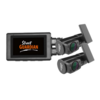What I've said is that CCTV cameras are FAR more reliable than dash cams.
No What you said about CCTV setups is anything but ambiguous, is taken verbatim from this thread, and definitely not out of context. You're implying that CCTV setups are basically without fault for months to years at a time. Insinuating near perfection.
I totally agree with the original list you posted earlier and the basic concepts you are talking about but my view is that instead of warnings about failures and errors we need to encourage dash cam manufacturers to strive to build dash cams that are less prone to failures in the first place! Again, more like CCTV camera reliability. They usually run 24/7 for months and years at a time in very challenging environments and very wide temperature extremes with zero failures.
Then...note the last sentence....Not May, Or Some...But USUALLY RUN (implying most or a large majority).
And yes, they can indeed be 100% reliable for very extended periods of time (years). As I mentioned previously, one of my cameras has been running perfectly almost 24/7 for 12 years. It sits in direct hot sun for many hours of the day. I will call that 100% reliable at this point. If you want to cherry pick my posts you might take note that I also mentioned a few camera failures over the years, primarily when the IR emitters eventually reach end of life after 50,000 hours or so and begin to fade or blink out so now the otherwise still working cameras then needed to be replaced in order to maintain the ability to see in the dark. When a camera literally dies of old age after many years and many ten of thousands of hours of perfect service running 24/7 I will say it was 100% reliable. No product lasts forever, but these cameras owed me nothing in the end.
Cherry picking is finding a post that may or may not be relevant to the given conservation. I simply went to
page 3 of this very discussion to extract the quote. Nothing cherry picked. What it now sounds like is back peddling.
1. You tell me about a near 100% reliable product.
2. You go on to describe "Wear and Tear" as natural or in this case 50,000 Hrs = 2083 days or 5.7 years
3. On your logic alone, running another CCTV system in Tandem makes no sense. But yet, you just told me how through
normal wear and tear, even the so called 100% reliable product fails.
A. Do you have physic abilities to know when said CCTV will fail?
B. Are you able to see into the future and set a definitive day and time said camera will fail?
Obviously, A and B are rhetorical questions with an clear "NO". Said camera could last 3 years, 5 years, or maybe ten. If someone keeps their same stups long term, at
some random time in the future, the product will begin or totally give out.
= Reason why Running 2 Dash Cameras is important for redundancy sake. I cannot know, nor can you, when these product will make its last record.
Just be clear, I'm talking about systems similar to mine which accommodate multiple cameras and have a central DVR or NVR in the $1200-$1800 range including recorder and multi-terabyte hard drive and depending which types of cameras you want to install. And also to be clear, as far as reliability is concerned I am talking specifically about the cameras, not the DVR itself. But FWIW, the DVR I've had in service has been operating for 12 years now, so I will call it 100% reliable at this point. But it is the cameras that correspond more directly to dash cams as they must function in highly challenging environments. The cameras in this case are similar in price to typical dash cams and usually cost between $150 and $200 or so each. Each of these cameras uses chip-sets, sensors and lenses that are nearly identical to the ones used in our dash cams. The chip-sets in many of our dash cams are available configured for surveillance cameras and are essentially the same thing. If you added a memory card slot and a screen to any of these CCTV cams I'm describing, you'd basically have a dash cam. A few years ago I installed a couple of lower priced vandal dome cameras that cost much less than I paid for the earlier ones but offer much higher performance. They too are very well built from cast aluminum with IP66 weather specs, thus VERY waterproof. No leaks. These too have proven highly reliable to date. I've never had a CCTV leak EVER, That's what
IP66 means.
So now we went from $200-300 USD Dash Camera system to a $1200-$1800 CCTV setup for comparison. Analogous to saying I bought a Toyota but I'm expecting Mercedes Luxury. To further prove your point, you hearken to a CCTV system that's anywhere from 6 and upwards of 8 times more expensive than
most if not all consumer grade dash cameras.
If anything you've proven what I said all along. You can't expect caviar on a beer budget taste. $1200-1800 buys far more in terms of durable equipment than the normal $200-300 dash cam.
Even so, CCTVs are outdoors. They are not sitting in a 93 Celcius / degree 200F enclosed environment in the dead of summer. Electronics LOVE cold, meaning colder the better. People have used liquid nitrogen to cool overclocked processors to test their limits. I've yet to hear many complaints (if any) that it was too cold and my camera failed. On the other hands, I've mentioned two dash cameras (139 and Zengox T3) where heat related failures
are a problem or at least in my case (139). To top it off, CCTV systems, even on a hot day are exposed to circulating air. A dash cam locked in a car with close windows has no such luxury.
I'm not sure what you're trying to prove, but if it was $1200-$1800 gets you a lot better, more reliable equipment, then this is a no brainer. If it was a $200-300 dash cam should function at the same level of reliability that a the $1200-$1800 cctv costs, be prepared for disappointment
End of day, make a fair comparison. Find me $200 or $300 home cctv setup with 99% positive reviews, uptime, and reliability, and we can then agee. Sadly, I surmise your endeavor to find such a product isn't on the horizon anytime soom.




